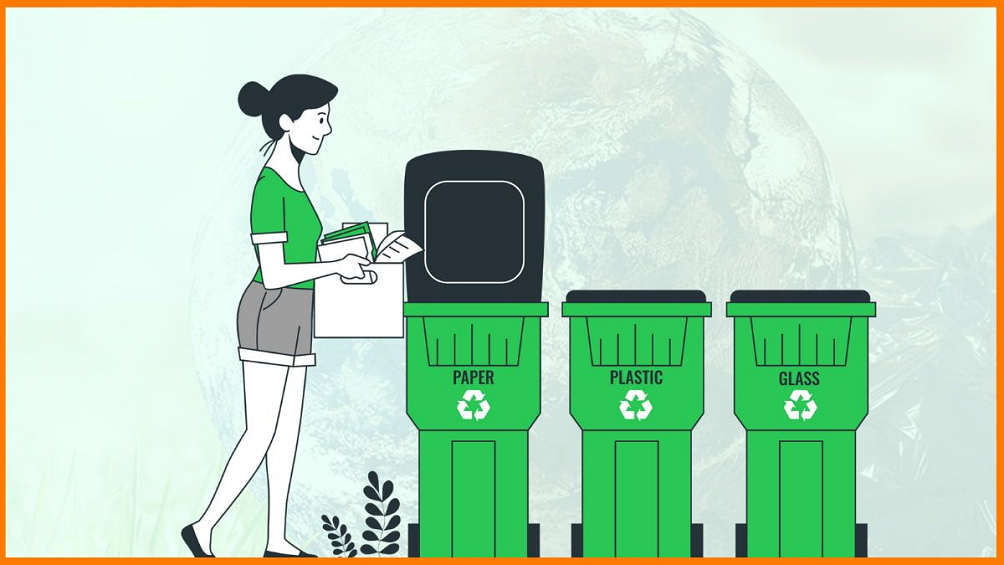In today’s world, where environmental sustainability is of utmost importance, businesses have a crucial role to play in reducing waste and minimizing their impact on the planet. Zero waste practices not only benefit the environment but also contribute to cost savings and enhance brand reputation.
In this article, we will explore what zero waste means and why it is essential for businesses to implement these practices. We will provide you with practical steps to help your business start its journey towards achieving zero waste. Additionally, we’ll address some common challenges faced by companies going zero waste and offer solutions to overcome them.
So let’s dive in and discover how your business can make a positive difference by embracing sustainable practices that lead towards a future of zero waste!
What is Zero Waste?
Zero waste is a concept and philosophy that aims to eliminate the generation of waste and prevent it from reaching landfills or incinerators. It encourages businesses to rethink their entire production process, from sourcing raw materials to disposing of finished products.
At its core, zero waste focuses on reducing, reusing, recycling, and composting materials instead of sending them to the landfill. The goal is to create a closed-loop system where resources are used efficiently and effectively without generating any waste.
By adopting this approach, businesses can significantly reduce their carbon footprint and conserve natural resources. They become more mindful about the materials they use, seeking alternatives that are environmentally friendly and sustainable.
Implementing zero waste practices also involves educating employees about proper disposal methods and encouraging them to make conscious choices both in the workplace and at home. This not only benefits the environment but also promotes a culture of sustainability within the organization.
Zero waste represents a fundamental shift towards more responsible business practices that prioritize environmental stewardship while remaining economically viable. It challenges companies to think creatively about how they can minimize waste throughout their operations and inspires innovation in product design, packaging solutions, and supply chain management. By embracing zero waste principles, businesses can pave the way for a greener future while enjoying numerous advantages along the journey.
The Benefits of Implementing Zero Waste Practices in a Business
Implementing zero-waste practices in a business can bring numerous benefits and advantages. It helps to reduce overall costs by minimizing the amount of waste generated, resulting in fewer expenses for disposal and recycling. By adopting sustainable practices such as reusing materials or finding alternative uses for them, businesses can save money on purchasing new resources.
In addition to cost savings, going zero waste also contributes to environmental conservation. When businesses reduce their waste output and adopt recycling processes, they help conserve natural resources and minimize pollution. This not only benefits the immediate surroundings but also has a positive impact on the wider ecosystem.
Furthermore, implementing zero waste practices enhances a company’s reputation and improves its brand image. Consumers are increasingly conscious of environmental issues and prefer to support businesses that prioritize sustainability. By demonstrating a commitment to reducing waste and promoting environmentally friendly practices, companies can attract eco-conscious customers who value sustainable products and services.
Moreover, embracing zero waste practices fosters innovation within an organization. It encourages employees to think creatively about ways to reduce wastage throughout various aspects of the business operations. This culture of innovation leads to improved efficiency and productivity as well as increased employee engagement.
Implementing zero waste practices brings financial savings while benefiting the environment and enhancing a company’s reputation among consumers. It is clear that striving towards achieving zero waste is not just good for business but also beneficial for society as a whole.
Steps to Implementing a Zero Waste Program
Implementing a zero waste program in your business may seem like a daunting task, but with the right steps and strategies, it can be achievable. Here are some key steps to help you get started on your journey towards becoming a zero waste business.
1. Conduct a Waste Audit: Begin by assessing your current waste management practices and identifying areas where improvements can be made. This will help you understand the types and amounts of waste generated by your business.
2. Set Goals: Establish clear and measurable goals for reducing waste in different areas of your business, such as packaging, energy consumption, or paper usage. These goals will provide direction and motivation throughout the implementation process.
3. Educate Employees: Employee engagement is crucial for the success of any sustainability initiative. Educate your staff about the importance of zero waste practices and train them on proper recycling techniques and waste reduction strategies.
4. Reduce Single-Use Items: Identify opportunities to replace single-use items with more sustainable alternatives or implement reusable options whenever possible. Encourage employees to bring their own water bottles or coffee cups instead of using disposable ones.
5. Implement Recycling Programs: Ensure that proper recycling bins are available throughout your workplace and clearly labeled for different types of recyclables such as paper, plastic, glass, or metal. Make sure employees know what can be recycled and how to properly sort their waste.
6. Promote Composting: If applicable to your industry or location, consider implementing a composting program for organic materials like food scraps or yard trimmings rather than sending them to landfill.
7. Track Progress: Monitor and measure your progress regularly by tracking key performance indicators related to waste reduction targets set earlier on in step 2.
This will allow you to identify areas where further improvements can be made.
Challenges and Solutions for Businesses Going Zero Waste
Implementing a zero waste program in a business can be an exciting and worthwhile endeavor. However, it is not without its challenges. One of the main obstacles businesses face when striving for zero waste is changing long-standing habits and practices. Employees may resist change or struggle to adapt to new procedures.
To overcome this challenge, clear communication and employee engagement are key. Providing training sessions on the importance of zero waste and how to implement sustainable practices can help employees understand the rationale behind the changes. Additionally, involving employees in decision-making processes and seeking their input can foster a sense of ownership and commitment.
Another challenge that businesses may encounter is finding cost-effective alternatives to single-use items or packaging materials. While eco-friendly options are becoming more readily available, they often come at a higher price point.
To address this challenge, businesses can explore partnerships with local suppliers or manufacturers who prioritize sustainability. By supporting these eco-conscious businesses, companies can potentially negotiate better prices for bulk purchases of environmentally friendly products.
Furthermore, implementing proper waste management systems within the organization is essential but can pose logistical challenges. Sorting different types of waste correctly requires clear labeling, designated bins or containers, as well as ongoing monitoring to ensure compliance.
Businesses should consider appointing a dedicated sustainability team responsible for overseeing waste reduction efforts and ensuring proper disposal methods are followed consistently across all departments.
Maintaining momentum towards zero waste goals over time can also prove challenging for businesses due to competing priorities or limited resources allocated towards sustainability initiatives.
By integrating regular progress assessments into company-wide meetings or reporting structures, organizations can keep stakeholders accountable while celebrating milestones achieved along the way. This consistent tracking helps maintain focus on achieving zero waste objectives even when faced with other pressing demands.





